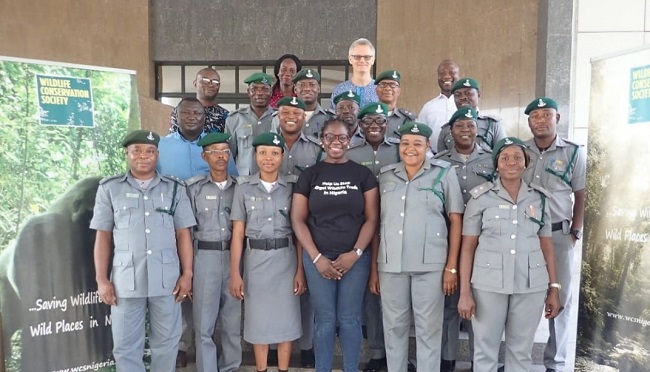As an important transit country for the illegal
wildlife trade from central Africa to China and Vietnam, Nigeria has attracted
international criticism and sanctions. Andrew Dunn
Country Director, Nigeria Programme, the Wildlife Conservation Society (WCS),
explores the role of the Nigeria Customs Service towards combating the illicit
trade

The illegal wildlife trade is estimated to be worth more than $150 billion per year and is the fourth largest illegal trade in the world, after drugs, weapons & human trafficking. The trade includes both plants such as rosewood and ebony, as well as animals such as elephant ivory, pangolin scales, parrots, shark fins, amphibians and reptiles (for the pet trade).
CITES (the Convention on International Trade in Endangered Species of Wild Fauna and Flora) is an international agreement between governments whose aim is to ensure that international trade in specimens of wild animals and plants does not threaten their survival. Unfortunately CITES has not been able to control the illegal wildlife trade and the problem is growing, due to high demand from Asia and elsewhere. The illegal wildlife trade is a low risk business with high returns, fueled by corruption, weak law enforcement, weak judicial systems and light sentences.
The elephant population across Nigeria and the rest of Africa has declined by 90% in the last century due to hunting for ivory. Due to its porous borders, Nigeria has become an important transit country for the ivory trade from central Africa to China and Vietnam. There have been some huge seizures of ivory recently, illegally shipped from Nigeria. This includes 3.5 tons of ivory from Nigeria seized in Singapore in March 2018, with a value of N900 million.
Pangolin scales are used for traditional medicine in China and are the world’s most trafficked mammal. The scale of the pangolin trade is enormous. A single shipment of 2,800 kg of pangolin scales from Nigeria was seized in Hong Kong in March 2018 with a value of N1.2 billion. In 2018 alone the Nigeria Customs Service seized pangolin scales valued at N10 billion in Lagos.
Rosewood, also known as Kosso or Madrid, is used for high-end boutique furniture in China.
The rosewood boom started in Gambia and Benin, and Nigeria soon became the world’s largest exporter of rosewood logs until 2018 when CITES suspended all trade in rosewood from Nigeria.
Unfortunately, the logging continues. In 2017 it was alleged that 1.4 million illegal rosewood logs from Nigeria, worth more than N100 billion, were laundered into China.
With funding from the UK’s Illegal Wildlife Trade Challenge Fund managed by the Department for Environment, Food and Rural Affairs, the Wildlife Conservation Society facilitated a two-day workshop in Calabar, Cross River State from March 13 to 14, 2019 for the Nigeria Customs Service. The theme of the workshop was: “Combating the Illegal Wildlife Trade in Nigeria: the role of the Nigeria Customs Service”.
The workshop was led by Abimbola Animashawun of the Nigeria Customs Service and National Contact Point for the World Customs Organisation, Regional Intelligence Liaison Office for West Africa. Over 20 officers of the Nigeria Customs Service attended the workshop together with staff from the Wildlife Conservation Society.
It was recognised that despite the number of arrests and seizures made by Customs, prosecution has been weak. To reduce the illegal wildlife trade, we need to secure convictions and jail sentences to act as a deterrent.
Staff of the Customs Service recognised the need for better documentation of arrests to facilitate more effective prosecution.
